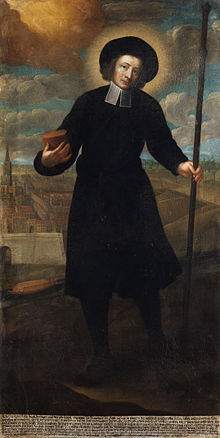Severinus of Noricum
| Saint Severinus of Noricum | |
|---|---|

Saint Severinus of Noricum, 18th century
|
|
| Apostle to Noricum | |
| Born | c. 410 Southern Italy or Africa |
| Died | 8 January 482 Favianae, Noricum (today's Mautern an der Donau |
| Venerated in |
Roman Catholic Church Eastern Orthodox Church |
| Major shrine | Abbey of San Severino, Naples, Italy |
| Feast | 8 January |
| Patronage | Noricum (modern Austria); San Severo, Italy; Striano, Italy |
Severinus of Noricum (c. 410 – 8 January 482) is a saint, known as the "Apostle to Noricum". It has been speculated that he was born in either Southern Italy or in the Roman province of Africa. Severinus himself refused to discuss his personal history before his appearance along the Danube in Noricum, after the death of Attila in 453. However, he did mention experiences with eastern desert monasticism, and his vita draws connections between Severinus and Saint Anthony of Egypt.
Saint Severinus of Noricum is not to be confused with Severinus of Septempeda, the brother of Saint Victorinus of Camerino, and a bishop of Naples, whose feast day is celebrated on the same day, 8 January.
The mysterious high-born Severinus is first recorded as travelling along the Danube in Noricum and Bavaria, preaching Christianity, procuring supplies for the starving, redeeming captives and establishing monasteries at Passau and Favianae, and hospices in the chaotic territories that were ravaged by the Great Migrations, sleeping on sackcloth and fasting severely. His efforts seem to have won him wide respect, including that of the Germanic chieftain Odoacer. Eugippius credits him with the prediction that Odoacer would become king of Rome. However, Severinus warned that Odoacer would rule not more than fourteen years.
Severinus also supposedly prophesied the destruction of Asturis (perhaps Klosterneuburg), Austria, by the Huns under Attila. He established refugee centers for people displaced by the invasion, and founded monasteries to re-establish spirituality and preserve learning in the stricken region.
...
Wikipedia
